Inspection Confirms Allegations of Animal Welfare Failures at HSUS’s Project Chimps
The News
A highly anticipated “Chimp Welfare Assessment” conducted by renowned primatologist Dr. Steve Ross documented inadequate veterinary care, insufficient access to the outdoors and an inexperienced staff at Project Chimps, a Humane Society of the United States (HSUS) sanctuary in Georgia with 78 chimpanzees. The assessment, which examines welfare management programs, spaces and socialization, was conducted in November 2020 in response to public outcry generated by evidence of animal cruelty posted on HelpTheChimps.org by two whistleblowers who worked with the chimps, Crystal Alba and Lindsay Vanderhoogt.
Chimp Welfare Management Programs
In the programs category, Dr. Ross gave Project Chimps a D (67%). This category assesses veterinary services, enrichment, training, safety, staffing and diet. According to Dr. Ross, “There is relatively little veterinary experience” and “veterinary resources are moderate.”
For years, Project Chimps employees and volunteers have privately – and ultimately publicly – raised concerns about substandard, dangerous and inhumane veterinary care. Even with well-documented, specific examples, HSUS and Project Chimps routinely dismissed staff and volunteer complaints about veterinary care.
Dr. Ross also addresses the “low experience level” of the staff, which Project Chimps attributes to a small pool of potential applicants. According to the whistleblowers, however, the experience level is low because Project Chimps has fired several highly experienced veterinarians and caregivers who voiced concerns about welfare issues and replaced them with junior, inexperienced and malleable staff members. Project Chimps claims that inexperienced staffers can learn on the job, but former staff members note that the organization no longer employs experienced managers who can adequately train junior staff.
Chimp Spaces
In the “spaces” category, Dr. Ross gave Project Chimps a B- (81%). This category encompasses the “physical housing of the chimpanzees, including environmental complexity and opportunities for choice.” Dr. Ross noted that “a substantial drawback of the space was the relatively limited access to the outdoor yards.”
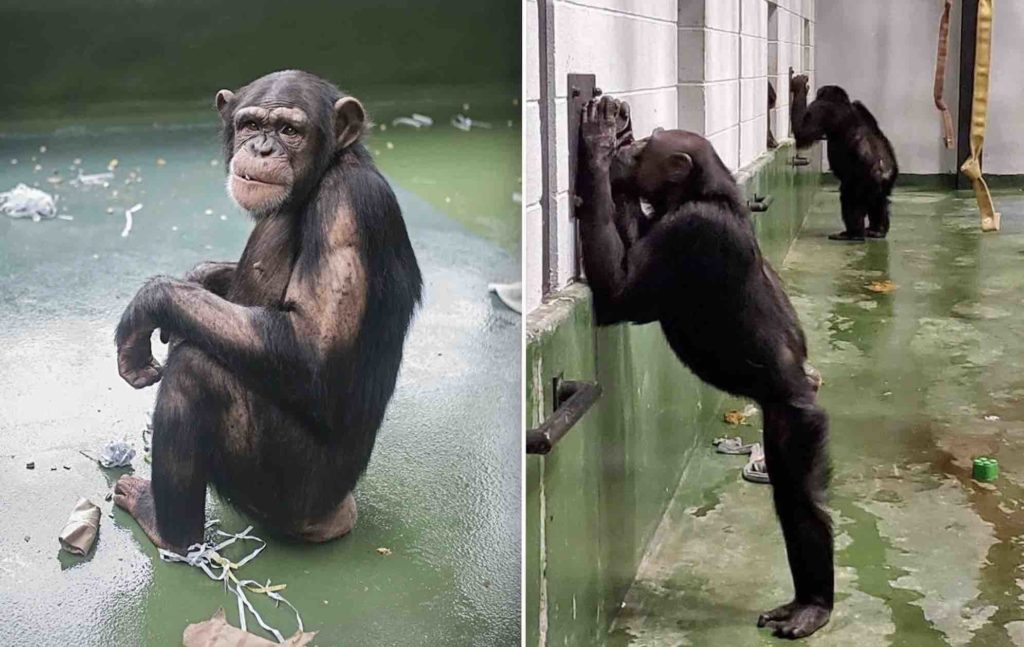
At Project Chimps, the 78 chimpanzees are held in concrete enclosures for all but 10 hours a week, according to whistleblowers
According to the whistleblowers, the 78 chimpanzees have access to the habitat for approximately 10 hours per week. They spend the remainder of the time in concrete enclosures.
Even before Project Chimps creates additional yards on its 200 acre property, it could, according to former staffers, increase outdoor time for all of the chimps in the current habitat if management made it a priority.
On occasion, the chimps are denied their scheduled time in the outdoor habitat when a paid tour group is on site. That is because management will put out a chimp group that is more likely to entertain visitors. This was a source of frustration for Crystal Alba, the whistleblower: “Sanctuaries are supposed to prioritize the welfare of the animals, not the amusement of the tour groups.”
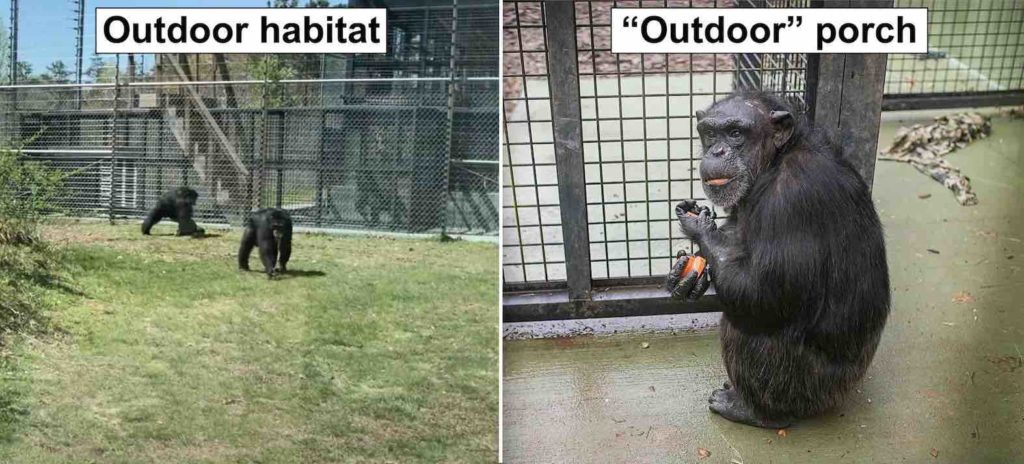
The 78 chimpanzees at Project Chimps have access to an outdoor habitat for approximately 10 hours per week. They spend the remainder of their days in concrete porches that HSUS and Project Chimps describe as “outdoors”
Chimp Social Life
A third section of the report grades the sanctuary on the “social life of the chimpanzees living in their groups.” In this category, Dr. Ross gives Project Chimps an A (94%). This score reflects the fact that the chimps live in robust social groups. However, Dr. Ross explicitly stated that he did not observe every chimp at the facility or assess the social condition of individual chimps.
The Release of the Report
On October 24th, Dr. Ross publicly stated that he was finalizing his assessment and would post it on his ChimpCare website in November. That never happened. On November 30th, he posted just a brief synopsis of his assessment and wrote that Project Chimps “has been provided a detailed report.”
Instead of posting the stand alone report, Project Chimps created a new document that featured its own responses to the report alongside a blurry, illegible version of the report itself. Due to public pressure, Project Chimps eventually posted a somewhat more legible version of Dr. Ross’s report, but it is still difficult to read and is “covered up” by Project Chimps’ responses (see image below).
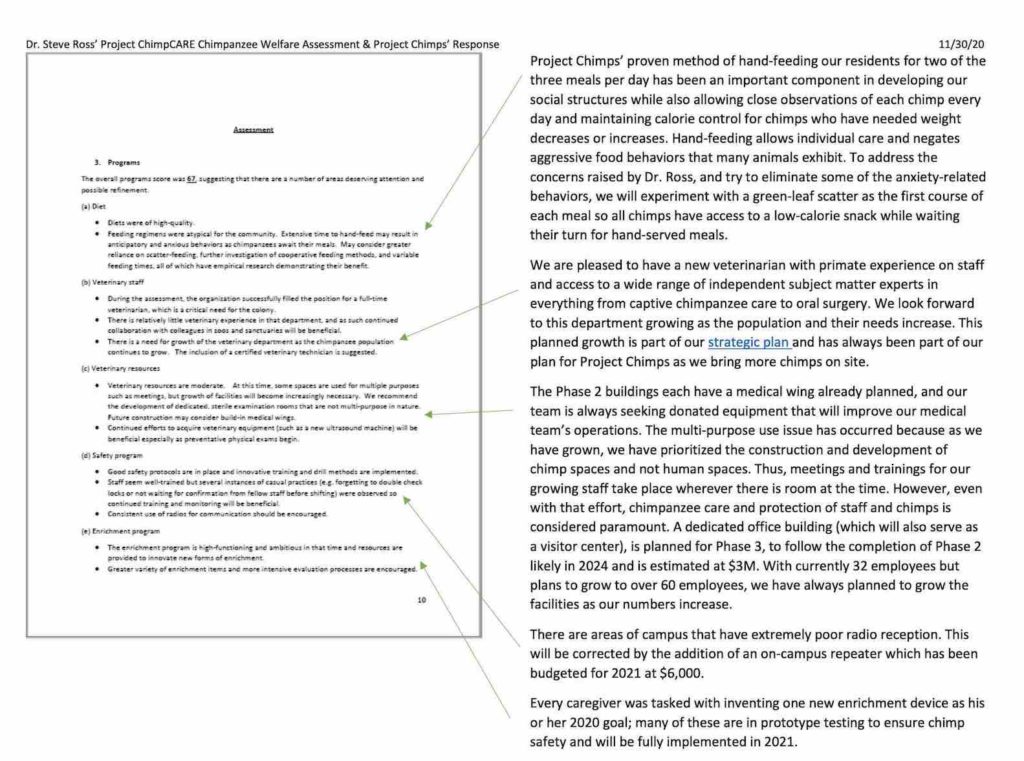
Instead of posting Dr. Steve’s Ross’s assessment of the sanctuary, Project Chimps created a response document that blurred Dr. Ross’s report.
The duplicitous way in which this report has been released reinforces the mistrust that exists among the growing number of whistleblowers, advocates and donors who have been speaking out about the lack of proper leadership and egregious welfare issues at Project Chimps. It also leaves advocates asking several questions:
- Why didn’t Dr. Ross publish the full report on his ChimpCare website in the first place?
- Once he saw that Project Chimps posted a marked up, blurry version of his report, why didn’t Dr. Ross post the report on his own website?
- Given that Dr. Ross is a published, well regarded scientist, wouldn’t he want his peers in the science and primate sanctuary communities to have the opportunity to review the complete report, which is the first one produced using his ChimpCare tool?
In response to some of these questions, Dr. Ross tweeted on December 10th that “it was never communicated that the full report would be public,” but that contradicts the October 24th tweet in which he stated that his report will be posted on ChimpCare.org in November. It also flies in the face of transparency, standard scientific principles and research practices. To assess the validity of research findings, the complete methodology and analyses should be made available for review. Dr. Ross published the equivalent of an abstract.
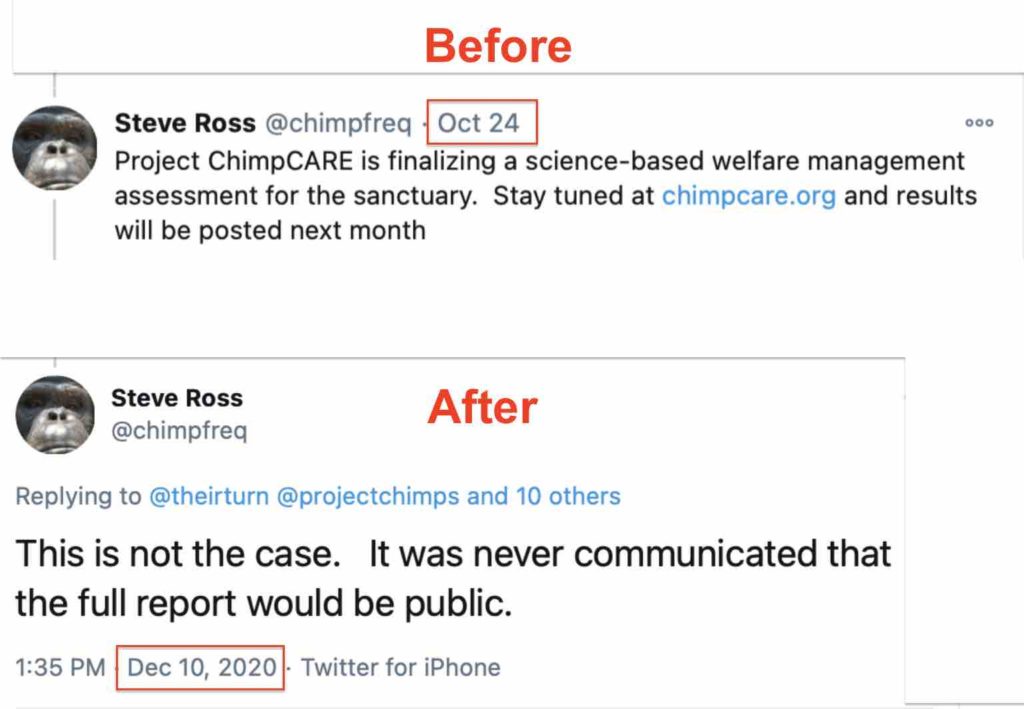
Based on Dr. Steve Ross’s tweets and social media posts by HSUS and Project Chimps, the activist groups advocating on behalf of the chimps assumed that Dr. Ross would post his complete report.
The assessment conducted by Dr. Ross was commissioned by the Arcus Foundation.
The Global Federation of Animal Sanctuaries Inspection
In February 2020, about five months before Dr. Ross began his assessment, the Global Federation of Animal Sanctuaries (GFAS) conducted a one-day inspection at Project Chimps. While HSUS claimed that “Project Chimps invited GFAS to provide an objective outside assessment,” Crystal Alba said that the “inspection was conducted in direct response to whistleblower complaints and under pressure from PETA.”
After the GFAS inspection, HSUS claimed that “the assessment confirmed that claims alleging mistreatment of chimpanzees are unfounded and misleading.” Alba, who was present for the investigation, disputes HSUS’s claim. “The two inspectors did not attempt to hide how unhappy they were about the nesting material, lack of climbing structures, small living areas and more. Project Chimps was required to address these issues as a result of this inspection.”
While GFAS, HSUS and Project Chimps refused to make that report public, Project Chimps did post seven recommendations made by GFAS which corroborated the whistleblower complaints.
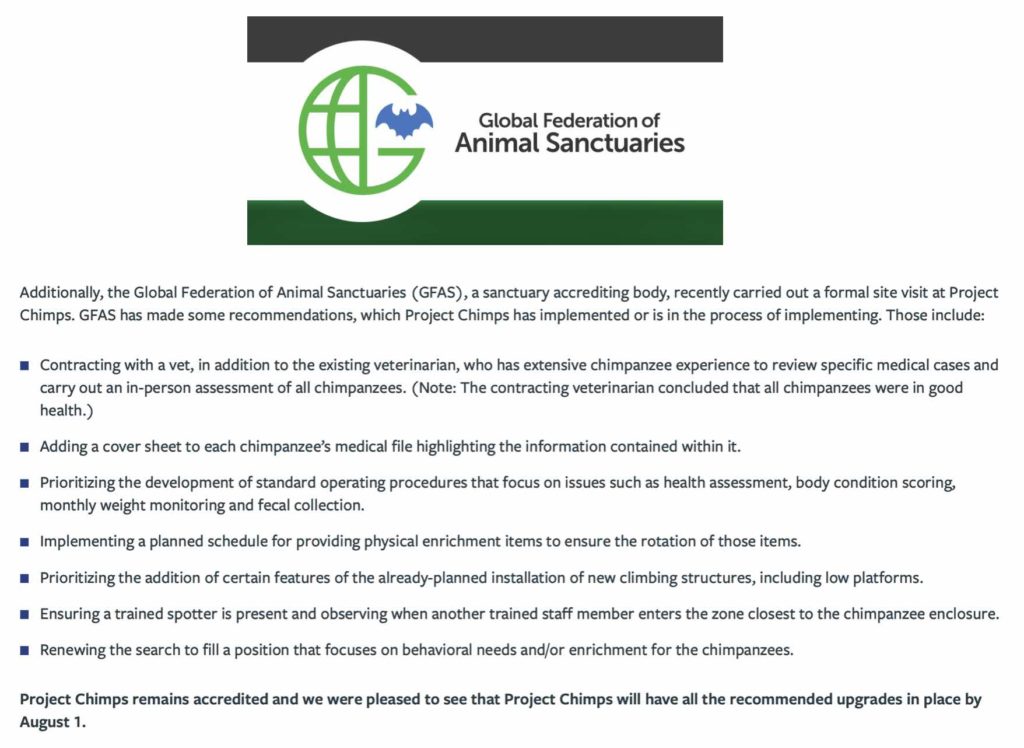
The Global Federation of Animal Sanctuaries (GFAS) made some of the same recommendations as the whistleblowers to improve the welfare of the chimps
In a public statement about the GFAS report posted on August 15th, HSUS wrote that Project Chimps “completed” implementing GFAS’s recommendations. In the same statement, HSUS wrote that the GFAS report exonerated them: “That assessment confirmed that claims alleging mistreatment of chimpanzees were unfounded.”
How can HSUS and Project Chimps claim that welfare issues have been fixed in the same statement in which it claims they didn’t exist in the first place?
Furthermore, if the problems raised by GFAS were, in fact, fixed, then how does HSUS explain the D grade for welfare management programs that Dr. Ross gave Project Chimps less than six months later?
The Internal Investigation
In December 2019 (before the GFAS and Ross investigations), multiple chimpanzee caregivers and sanctuary volunteers began to contact outside agencies because Project Chimps executives and board members refused to acknowledge or address the welfare issues at the sanctuary. In response, Project Chimps announced that it would initiate an “internal investigation.” This investigation was conducted by Katie Conlee, an HSUS employee who also serves as Vice President of the Board of Project Chimps.
According to Alba, “Staff eagerly awaited the results of the Conlee investigation, but they were never allowed to see them. They were simply told that the Conlee investigation found no problems with operations at Project Chimps. When the Conlee report was leaked, we realized that the intent of the investigation was to discredit and silence employees, not to address the welfare issues they raised.”
The leaked report showed that Conlee did document management problems. She wrote, “The investigation has revealed that the root causes of various problems appear to be inadequate management, communications and transparency regarding concerns raised by staff and subsequent decision making.” The whistleblowers and other activists advocating on behalf of the chimps argue that, in order for animal welfare issues to be resolved, the management needs to be replaced.
Assessment Report Raises More Questions
The fact that Dr. Ross’s assessment corroborates the whistleblower complaints about poor veterinary care, inadequate access to the outdoors and inexperienced staff begs the following questions.
1. How do HSUS and Project Chimps reconcile the findings of Dr. Ross’s report with their multiple public statements claiming that chimp care is excellent and that welfare concerns are invalid?
Between 2016 and 2019, approximately 15 employees, volunteers and donors submitted complaints about animal welfare to the management and board of Project Chimps. According to Vanderhoogt, several of the people who raised concerns, including veterinarians, vet techs and caregivers, were fired. Alba, who served as both a chimp caregiver and the staff photographer, was one of them. Many other employees who came forward were “bullied” into silence.
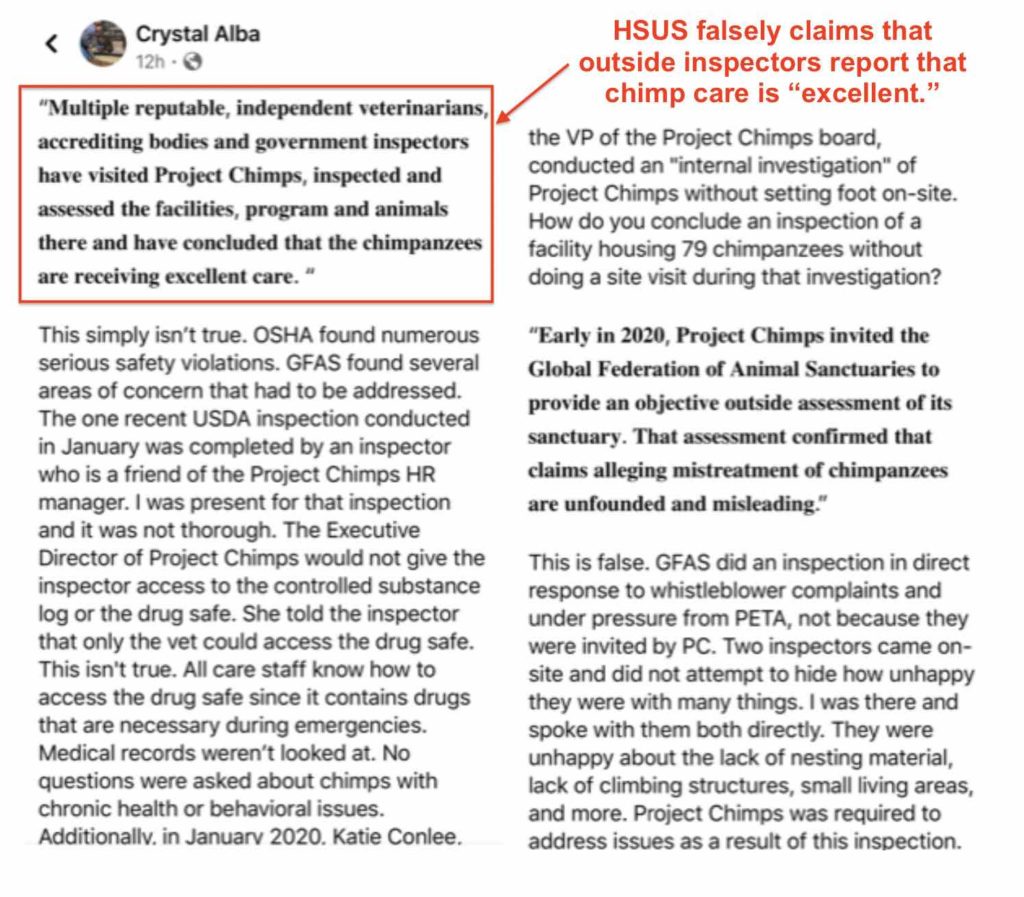
Throughout 2020, HSUS repeatedly claimed that outside inspectors have indicated that animal care is excellent at Project Chimps when they have, in fact, corroborated many of serious animal welfare problems exposed by whistleblowers.
In January 2020, the Board’s President, Bruce Wagman sent an email to employees and volunteers dismissing the complaints. “We found zero actual problems in the chimpanzee welfare area, and zero valid concerns with our veterinary efforts.” Alba notes that, prior to becoming the Chairman of the Board of Project Chimps, Wagman had no chimpanzee experience.
In May 2020, 22 whistleblowers who worked or volunteered at Project Chimps sent a letter to Wagman requesting a meeting with the Board to discuss their concerns. Wagman again dismissed their concerns as “unfounded” and “untrue” and stated that, “we will not engage on this matter with you moving forward.”
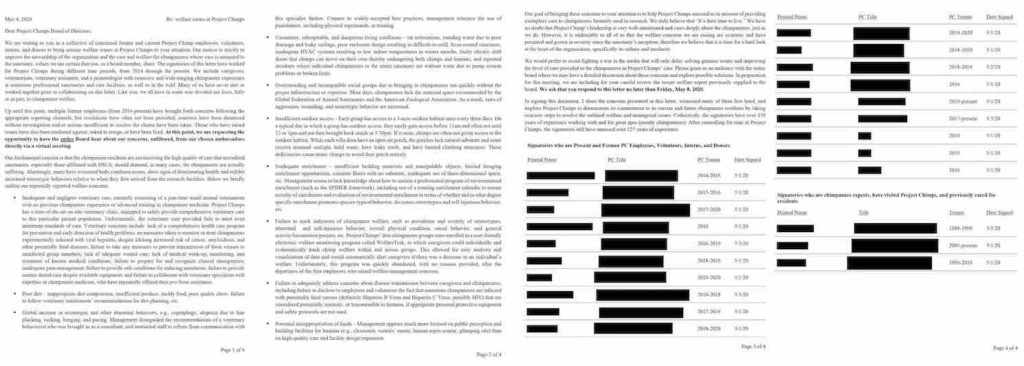
Letter to Project Chimps Board of Directors signed by 22 staffers and volunteers who worked at the sanctuary
Throughout 2020, other former employees of Project Chimps posted testimonials about animal welfare issues, despite their concerns about retribution by HSUS and Project Chimps. The following testimonial was posted on July 14th by Michael Cullen-Bedoya, who worked as a chimpanzee caregiver.
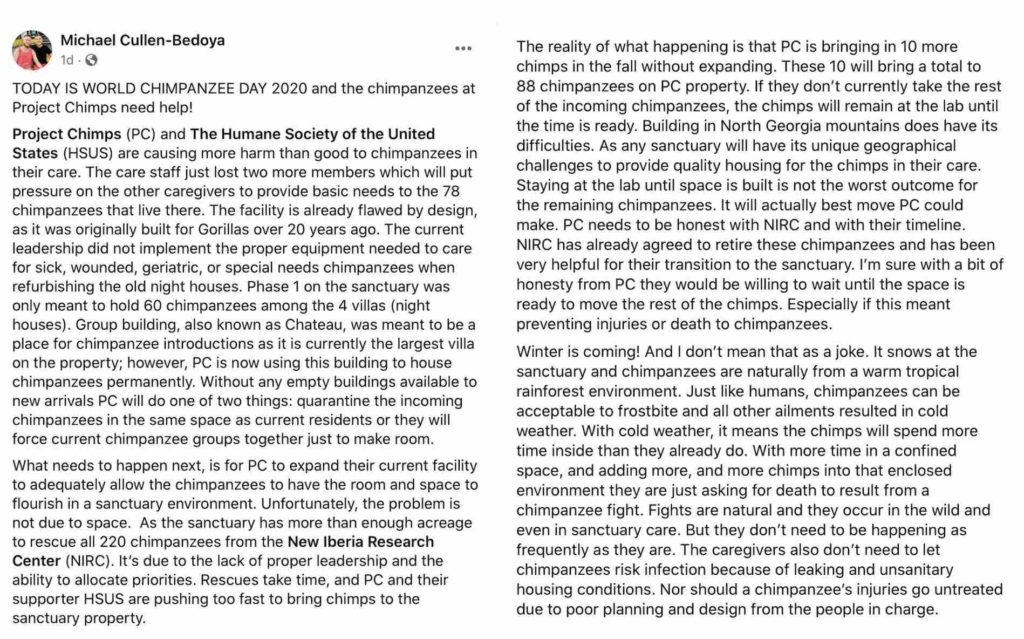
In spite of concerns about retribution by HSUS and Project Chimps, former employees of Project Chimps have posted testimonials about animal welfare issues. This one was posted on July 14, 2020
2. Now that the whistleblower allegations have been corroborated by Dr. Ross’s assessment, will Project Chimps and HSUS apologize for suing them?
While employed by Project Chimps as an animal caregiver, Alba documented many of the animal welfare infractions that she observed, including untreated wounds, insufficient enrichment, infrequent access to the outdoors, the elimination of substrate and rushed introductions. When her three year effort to effect change from within the organization failed, Alba, in collaboration with Vanderhoogt, posted this documentation online. Taking a page out of the playbook of the animal agriculture industry, Project Chimps filed a lawsuit to intimidate and silence them.
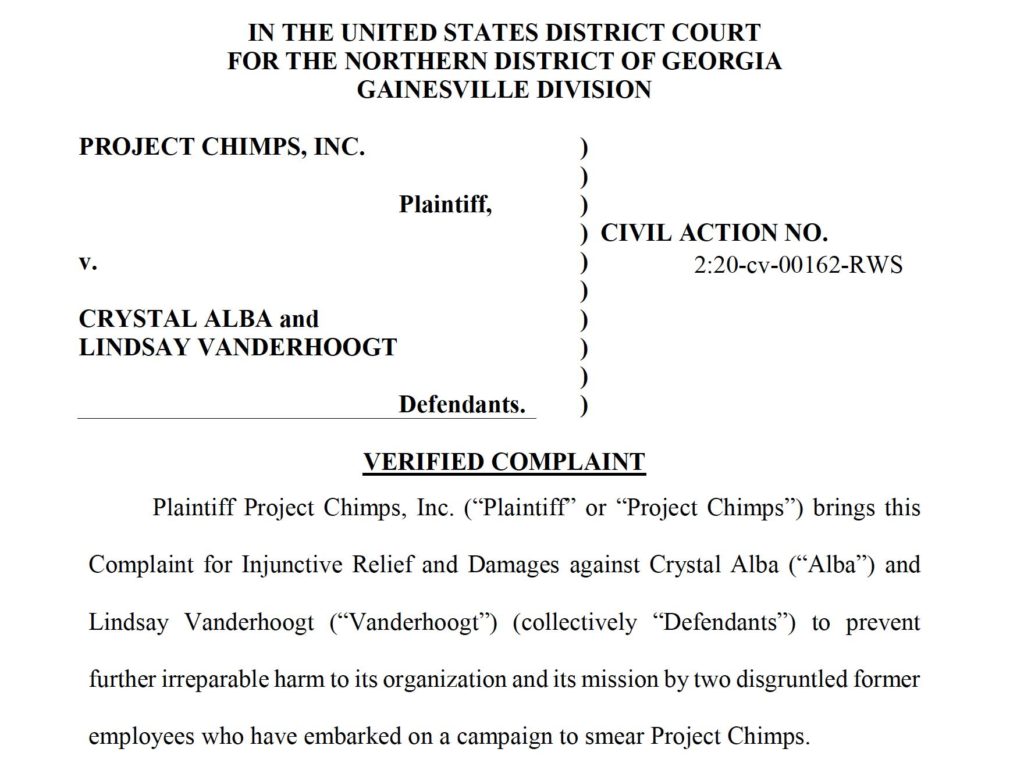
On June 1st, 2020, Project Chimps filed a lawsuit against whistleblowers Crystal Alba and Lindsay Vanderhoogt in an attempt to intimidate and silence them.
Even though HSUS held 6 of the 11 seats on Project Chimps’ board and paid the salary of the organization’s Executive Director, HSUS tried to distance itself from the lawsuit, claiming it had no decision-making power. HSUS also refused to condemn the lawsuit, even though whistleblowing is a vital tool employed by animal advocacy organizations, including HSUS.
Angered by the lawsuit and chimp mistreatment, animal rights activists began targeting HSUS board members with protests. Soon after a protest at the San Francisco home of HSUS Board Chair Susan Atherton, Project Chimps dropped the lawsuit.
The Project Chimps lawsuit sent a chilling message to advocates at other institutions who might have come forward to blow the whistle about animal abuse. If a self-proclaimed animal protection organization like HSUS supports the use of litigation to silence people reporting animal abuse, then companies that earn profits off of abuse would assuredly do the same.
Criticism from National Animal Rights Groups
In October, 2020, the Nonhuman Rights Project (NhRP), animal rights organization that seeks to upgrade the legal status of animals, took the unusual step of speaking out publicly about the welfare conditions at Project Chimps after HSUS dismissed its concerns about Hercules and Leo, chimpanzees who ended up at Project Chimps after NhRP liberated them from a laboratory in New York.
In its statement, NhRP wrote, “We demand that Project Chimps and HSUS take whatever steps and devote whatever resources are necessary to immediately provide them with daily access to an outdoor habitat, either at Project Chimps or any other suitable place. We also strongly urge Project Chimps and HSUS to immediately take concrete action to enable the other chimpanzees at Project Chimps to have daily access to the outdoors, not two or more years from now, but today.”
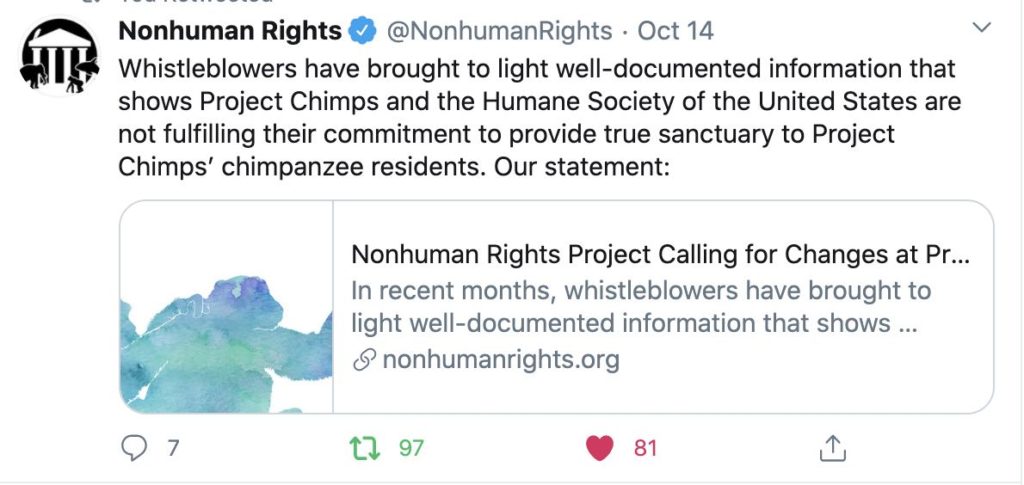
After successfully liberating chimpanzees Hercules and Leo from a laboratory in Stonybrook, New York, attorneys with the Nonhuman Rights Project are having to once again fight to free them. They are demanding that HSUS and Project Chimps provide them with access to the outdoors every day
In July, People for the Ethical Treatment of Animals (PETA) posted a statement in support of the whistleblowers.
National Geographic Investigation
On July 9th, National Geographic published an in depth, investigative story about the animal cruelty allegations. While it includes statements from both sides, the story paints a grim and disturbing picture of animal welfare that corroborates the allegations of the whistleblowers.
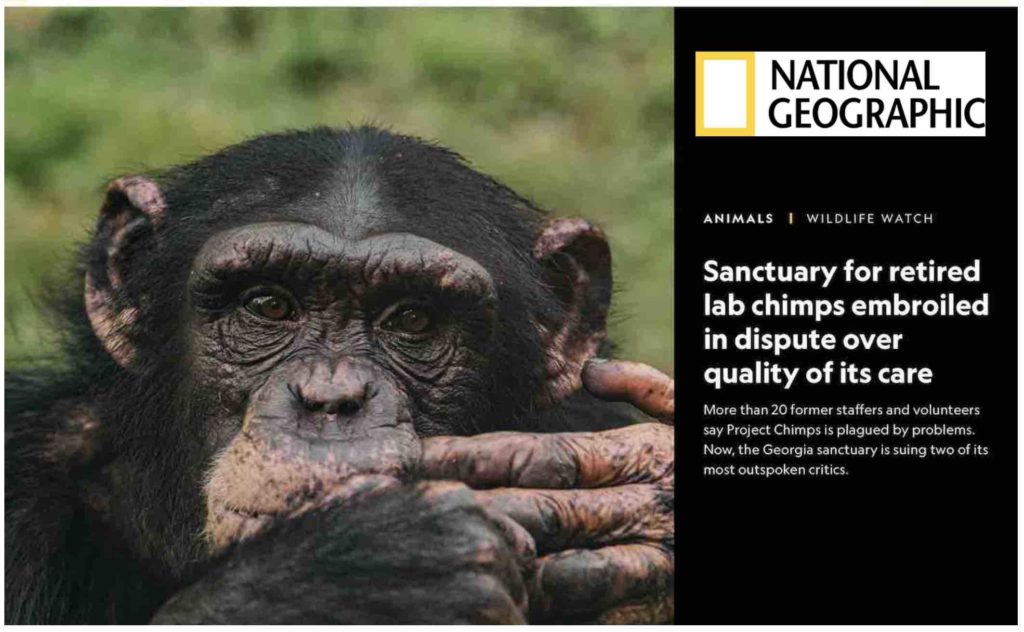
National Geographic investigative story about animal mistreatment at HSUS’s chimpanzee sanctuary, Project Chimps
In July, Progress for Science, TheirTurn and primatologist Bob Ingersoll began staging protests at the homes of HSUS board members, including Brad Jakeman (Sag Harbor, NY), Steven White (Santa Monica, CA), Sharon Lee Patrick (NYC); and Susan Atherton (San Francisco).
HSUS Response
After Dr. Ross announced a D grade (67%) for animal welfare programs, HSUS was left with no choice but to acknowledges that Project Chimps needs to institute welfare reforms. By stating that it plans to help Project Chimps “prioritize the improvements that are most important,” HSUS unwittingly admits that many reforms are, in fact, needed. Nevertheless, HSUS used its public statement about the report as another opportunity to discredit the whistleblowers that recommended the reforms in the first place: “This independent assessment. .. confirms that allegations of abuse are profoundly off the mark.” Dr. Ross’s report doesn’t address the whistleblowers’ specific allegations of abuse, such as leaving open wounds untreated and depriving a particular chimp group of access to the outdoor habitat for eight months. In fact, Dr. Ross noted on his website that the grades “do not make any attempt to adjudicate past practices.”
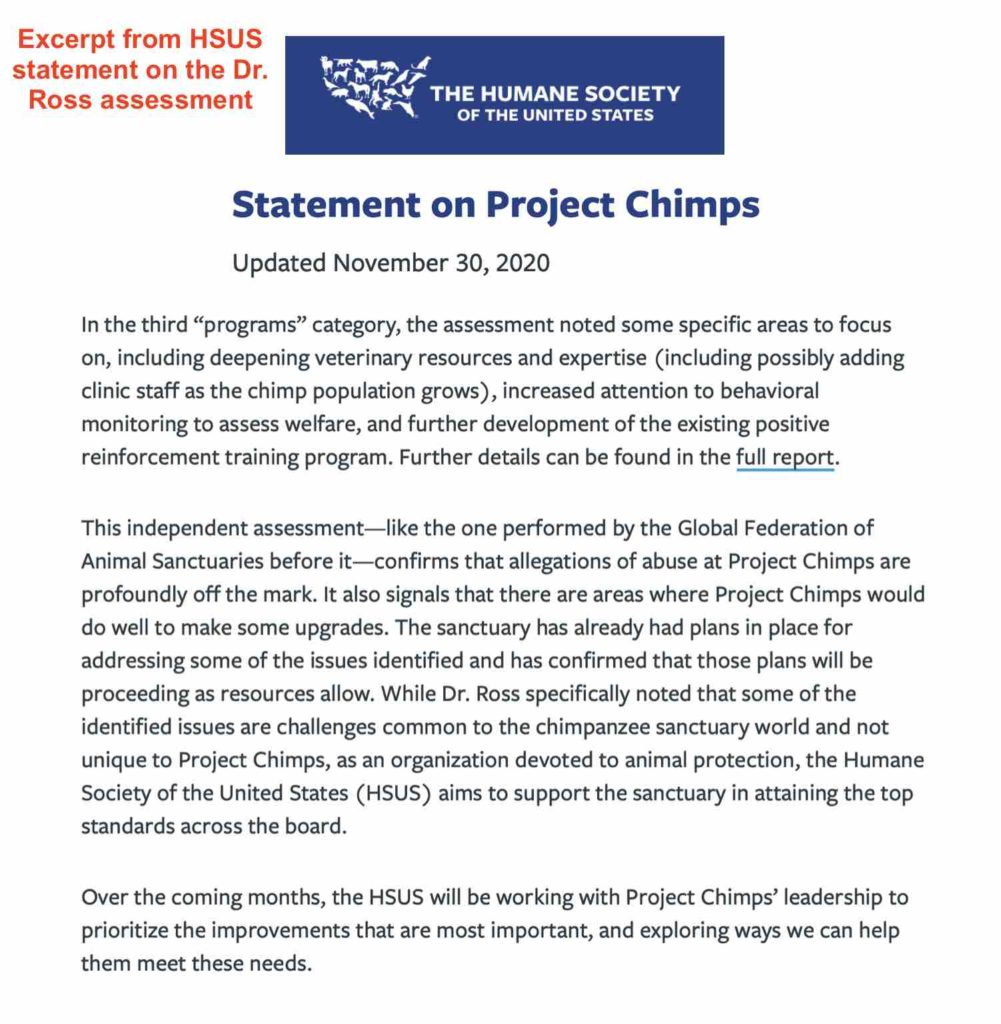
Given that Dr. Ross gave Project Chimps a D grade on animal welfare programs, HSUS was forced to acknowledge that welfare reforms are needed. It continued, however, to discredit the whistleblowers who made the same recommendations
In public statements posted after previous inspections revealed animal welfare issues, HSUS similarly spun the results instead of accepting responsibility for the welfare failures. “Multiple reputable parties—including a primate expert with years of experience, a renowned chimpanzee veterinarian, a sanctuary-accrediting organization and several government inspectors—have visited Project Chimps, assessed the facilities, program and animals there and have concluded that the chimpanzees are well cared for.”
What’s Next?
Under the current management, Project Chimps has subjected the 78 chimpanzees in its care to gross mistreatment. It has also mistreated its employees by suing whistleblowers; threatening “disciplinary action” against employees who, out of desperation, addressed their concerns with external organizations; firing those with the most experience and bullying others into silence or resigning.
According to former employees and volunteers, the welfare reforms proposed by Dr. Ross in his report can only be implemented under the right leadership — leaders who have chimpanzee experience; who command the respect of their staff and peers in the primate sanctuary community; and who instinctively prioritize the welfare of the animals. In addition to new management, Project Chimps needs to have at least two board members with captive chimpanzee experience.
Until HSUS and Projects Chimps do the right thing, advocates around the country vow to hold them accountable.
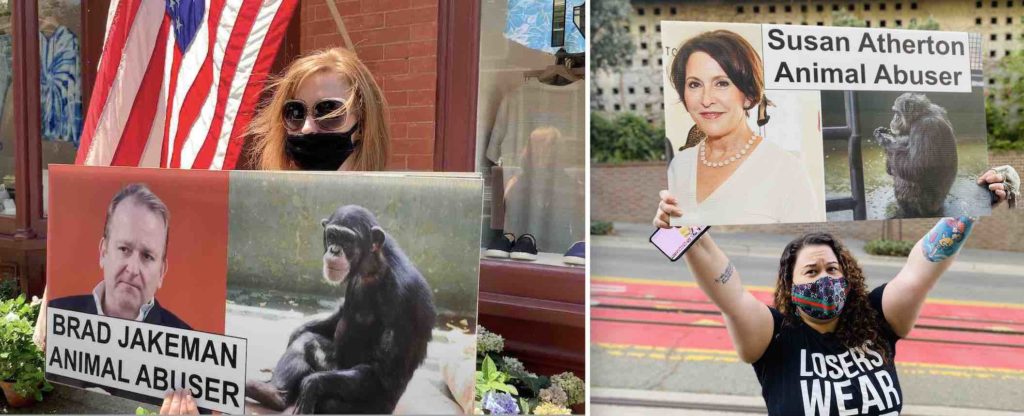
From left to right. Animal rights activists protest at Ryland, a clothing store in Sag Harbor, New York, co-owned by HSUS board member Brad Jakeman. Activists in San Francisco protest at the home of Susan Atherton, the co-chair of HSUS’s Board of Directors. Both Jakeman and Atherton have posted photos online in which they are wearing real fur.



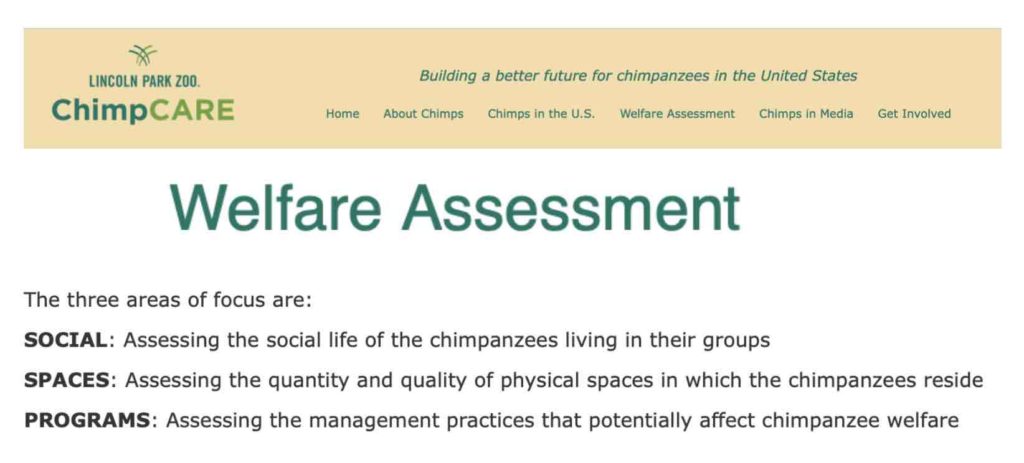
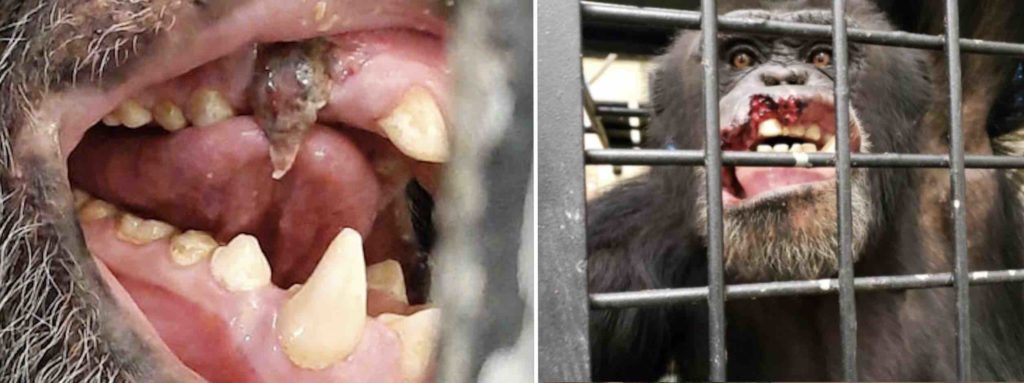

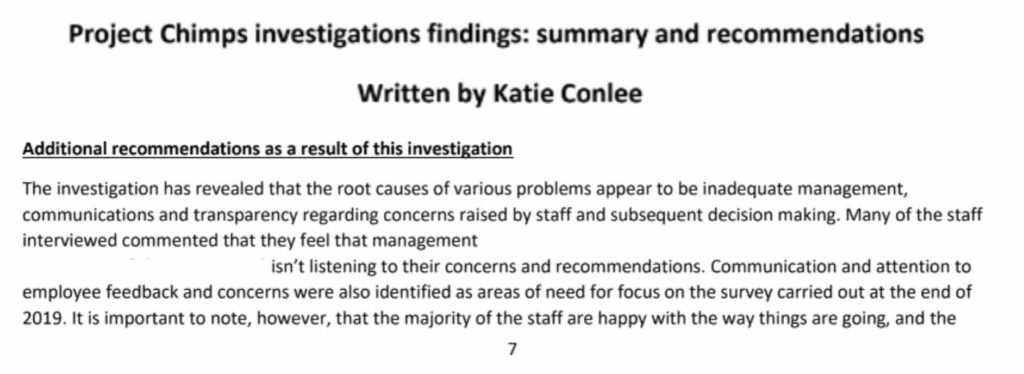
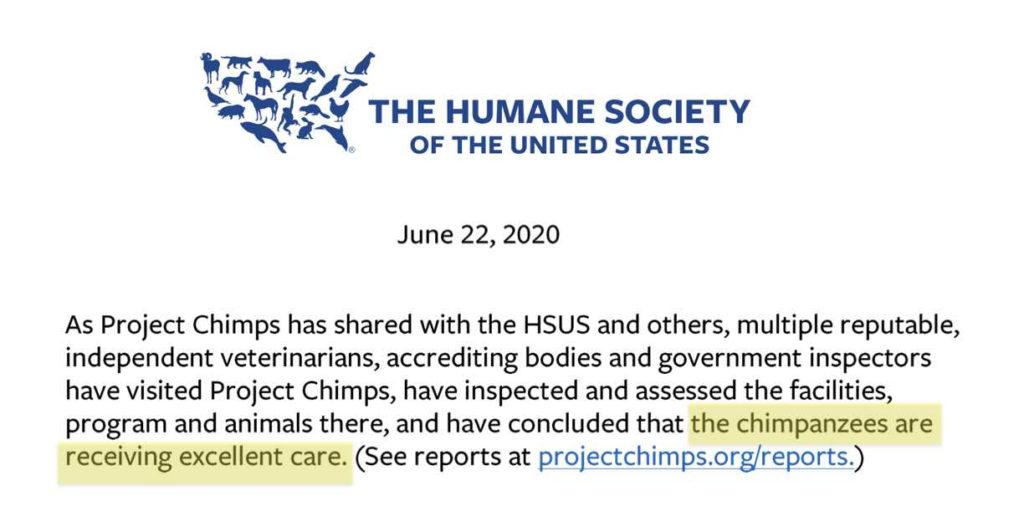
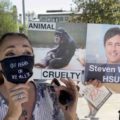
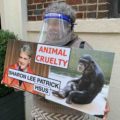
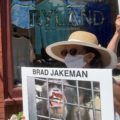
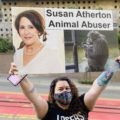
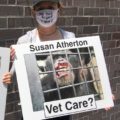
We need to take care of our animals
Money should be for the animals. Chimps deserve better and must live in habitats that fit their natural homes in the wild. An expert vet,for these primates is urgently needed. Please act immediately.
Jeanette: Because these chimps were born and raised in captivity in the U.S., they could never be released into the forests of Central and West Africa. They wouldn’t know how to survive, and they could carry diseases that could affect wild born chimpanzees. Unfortunately, the best we can do for them is provide them with a humane “retirement” in sanctuaries that provide them with daily access to a forested outdoor habitat, fulfilling enrichment activities, and top notch veterinary care and housing. They don’t have any of these things at Project Chimps, which is why so many advocacy groups and activists are speaking out on their behalf. Project Chimps could be a good sanctuary if HSUS would acknowledge the fundamental problems with the facility and its leadership and decide to invest in fixing both.
Let the chimps go back to the jungle.
Poor creatures, horrible way to live.
Disgusting n disgraceful! Give these animals better living conditions in the open air n cleaner living indoors!
Please do something to give these wonderful animals the life and the care they deserve. How can these people be so cruel?
Chimp Haven in Shreveport should be their model.
This is one of the animal charities I don’t donate to because of the exorbitant salary paid to the CEO.
Please stop hurting the chimpanzee help them to be normal
Stop this awful treatment to these chimpanzee Free them from their pain and torture you cause ,How awful
It’s wrong & sad to treat r fellow animals without dignity or respect. Some of these animals have helped to pioneer cures for deadly diseases. All the other chimpanzees still deserve to live in a good clean environment with medical care food socialization & interaction. We need to help ppl as well in Africa that live in such extreme poverty that to ask them to care for animals or anything else is really absurd but that is the only way to get them to look outside their own dire circumstances.
Fire the people that need to be fired and fix this now that simple clean house.
Set the chimps free
I admit, I did not read all of this article. If they have the money to care for our relatives properly spend it!!! If you don’t find an organization that will give them Heath care and quality of life they deserve.
Stop this now!
Why can’t you see how EVIL you are treating these beautiful animals – God did not create these chimpanzees to live like this Please in the name of Humanity, Stop this act immediately
This wrong PEOPLE.
The great humane society all the money donated and all the things are supposed to be doing. Make all them involved in this horrendous treatment these chimpanzees be damned. Not one more represent comes out of my pocket for them. I am finished.
This is horrible & so terribly sad! Free these poor Chimpanzees! All animals deserve a normal life!
These animals are from forests, jungles and plains. They need the earth, grass, trees and foliage around them to bring out their true behaviour and instincts. So sad to see them deprived of basic nature and outdoors when the space and outdoor facilities are already there. They are arboreal And bipedal so why the heck at the very least aren’t they given climbing apparatus indoors. What a depressing place and what greedy sick managers!
Not to mention the more chimpanzees are understood the more important they are becoming to the understanding of the evolution of humans.